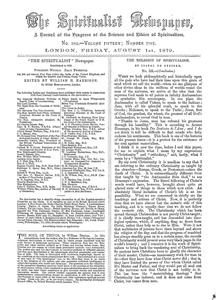HPB-SB-8-306: Difference between revisions
(Created page with "{{HPB-SB-header | volume = 8 | page = 306 | image = SB-08-306.jpg | notes = }} = Inlay = 200px|thumb|right|SB, v. 8, p. 306, inlay, back") |
mNo edit summary |
||
| (7 intermediate revisions by 2 users not shown) | |||
| Line 6: | Line 6: | ||
}} | }} | ||
{{HPB-SB-item | |||
| volume = 8 | |||
| page = 306 | |||
| item = 1 | |||
| type = image | |||
| file = SB-08-306-1.jpg | |||
| image size = 300px | |||
| status = ok | |||
| author = | |||
| title = And you are sitting, as of old, beside my hearth-stone, heavenly maid | |||
| untitled = | |||
| notes = | |||
| categories = | |||
| hide = yes | |||
}} | |||
{{HPB-SB-item | |||
| volume = 8 | |||
| page = 306 | |||
| item = 2 | |||
| type = image | |||
| file = SB-08-306-2.jpg | |||
| image size = 300px | |||
| status = ok | |||
| author = | |||
| title = The porch of Karli | |||
| untitled = yes | |||
| notes = | |||
| categories = | |||
| hide = yes | |||
}} | |||
{{HPB-SB-item | |||
| volume = 8 | |||
| page = 306 | |||
| item = 3 | |||
| type = article | |||
| status = proofread | |||
| continues = 306.1, 307.1 | |||
| author = De Steiger, Isabel | |||
| title = The Religion of Spiritualism | |||
| subtitle = No. III.—(Conclusion) | |||
| untitled = | |||
| source title = London Spiritualist | |||
| source details = No. 362, August 1, 1879, pp. 49-51 | |||
| publication date = 1879-08-01 | |||
| original date = | |||
| notes = | |||
| categories = | |||
}} | |||
{{Style S-Small capitals| When}} we look philosophically and historically upon all the gods who have had their time upon this grain of sand which we call the world—-when We see glimpses of other divine ideas in the millions of worlds round the suns of the universe, we arrive at the idea that the supreme God sends to all points in infinity Ambassadors to symbolize His sovereignty. In one place the Ambassador is called Vishnu, to speak to the Indians; Zeus, with all his splendid court, to speak to the Greeks; Mahomet, to speak to the Turks; Jesus, Son of G, the gentlest, the wisest, the greatest of all God’s Ambassadors, to reveal God in man. | |||
“Thanks to Jesus, man has refound his greatness through his humility.” This is according to Arsene Houssaye, in his book ''Des Destinies de l’Ame; ''and I do'' ''not think it will be difficult to find minds who fully endorse his sentiments. This book is one of the features of the present times—it is a protest for the existence of the soul against materialism. | |||
I think it is now the time, before I end this paper, for me to explain what I mean by my expressions “Christianity” and “orthodoxy,” and, lastly, what I mean by a “Spiritualist.” | |||
By my term Christianity it is needless to say that I am referring to the ordinary Christianity as taught by the churches—Roman, Greek, or Protestant—since the death of Christ. It is extraordinarily different from that taught by “the Ambassador from God,” to use Houssaye’s expression. The literal following of Christ’s words would have, however, brought about quite an altered state of things to those which now exist. An absolutely literal imitation of Christ’s life is an impossibility. What we are concerned in chiefly are the teachings and actions of Christ. Now, it is perfectly clear that we have almost lost the esoteric side of this'' ''teaching, and it is equally clear that we do not follow the exoteric side. The Christianity which has been spread through Christendom is not purely Christ-taught; I it is chiefly men-taught, and has descended into theological systems, which, if anything, drag us down from Christ, rather than help us to rise to Him. Were it not that multitudes of persons have risen beyond and above the religion of the day, and that the progress of mankind has always steadily gone on in a certain sense, the records of Christianity would present some very black pages in the world’s history; and I conceive it is the work of Spiritualism to bring back the wandering soul of Christianity. So anxious have Christians been to glorify the character of their master, Christ—an unnecessary work for man to do—that they have - done what Christ never did; that is, they have limited the power of One whom Christ called His Master and Father, and they would put all soul out of the universe now that Christ is not bodily in it. ''This ''has been the “materializing theology” that Christianity has induced, and it does not come from Christ, but comes from men. | |||
{{Style S-HPB SB. Continues on|8-306.1}} | |||
{{HPB-SB-footer-footnotes}} | |||
{{HPB-SB-footer-sources}} | |||
<gallery widths=300px heights=300px> | |||
london_spiritualist_n.362_1879-08-01.pdf|page=3|London Spiritualist, No. 362, August 1, 1879, pp. 49-51 | |||
</gallery> | |||
= Inlay = | = Inlay = | ||
[[File:SB-08-306.1.jpg|200px|thumb|right|SB, v. 8, p. 306, inlay, back]] | [[File:SB-08-306.1.jpg|200px|thumb|right|SB, v. 8, p. 306, inlay, back]] | ||
{{Style P-HPB SB. Title continued |The Religion of Spiritualism|8-306}} | |||
It has been taught by theological writers that revelation has ceased, and the logical following of this teaching has been naturally the materialism of the present day. No doubt this process has been required in the wisdom of Infinity for some perfecting of our powers. We cannot say—but we do know one thing, and that is that this materialised Christianity is not enough for us; and as a proof we point to the want of vitality in religion, and the dissatisfied, and unsatisfactory state of humanity when, in spite of the teaching of Christ to “love our neighbours as ourselves,” we are almost as far as ever from it practically. It is true that over a great portion of the face of the globe there is a wider spirit of toleration in religious matters. This is a phase in the world’s history, and does not belong to Christianity alone. By Christianity I mean, therefore, the religion practised by all who use the name of Christ as their head, and naturally in using the word “orthodox” I mean the party dominant by a majority of numbers or power in any church in Christendom. The unorthodox must always be the minority, and the term does not necessarily decide that one or other is right or wrong, and may apply to all forms of Christian worship, whether Roman or Protestant. The people who dissent from generally-received views are naturally those people who take the things of religion so much to heart that they have a distinct courage of their own to declare their persuasions, if they are not those entertained by their leaders. The mass follow their leaders; the few think for themselves. The orthodox may be right, or the unorthodox may be right. ''Who ''can really know? Only God can decide. So we must rest in charity with each other on that account, but we must have terms, nevertheless, of some kind. The unorthodox, ''i.e., ''those who are not content with the Christianity of the day, are those who will welcome the revival of spirit, and who will see through the vista of Spiritualism the light they are seeking for shedding its rays on the cold religion of the day—the religion which, unless reformed by an influx of a spiritual nature, must surely die, killed by our own hands. It will not, however, die—no religion perishes; it only becomes superseded by a fresh revelation of God’s power, when the power of the previous emanation is exhausted. This power ''is ''now exhausted—not, however, because the source is dry; but because we cease to go to the Fountain. | |||
The materialising process has reached the point at which it is not at all good for us to halt, and yet we are idly waiting and speculating this way and that way, instead of working for, and with, and through the powers of our souls. The time will come, if we leave our souls alone, and if we let them vapourise into our bodies, that even the spiritless form of Christianity which we have now amongst us will fall away. As it is, we are all undecided and divided, and because of our very indecision and division we let things alone, and call it “religious toleration,” whereas it is, in fact, religious indifference. | |||
From time to time, however, there are always to be traced the footsteps on “the sands of time” of people who have not lived in vain, or who are still living and not in vain. These, whether through the beauty of their lives, through their love of God, and of humanity as proceeding from God, leave precious records of their saintly lives; or whether through their noble deeds and works, whether exemplified through science, philosophy, or art, all those whose lives are marked out from the mass of mankind I place on one side. Under whatever religious dispensation they might be born, these minds would always have been as white stones raised up to build the altar to Divinity. Their characters and circumstances must necessarily, however, have been acted upon by Christianity, ''cela va sans dire; ''but these people I do not include. When speaking of the influence of Christianity in Christendom, I refer to the mass of so-called Christian humanity; and certainly this mass is still at so low a spiritual level as to fully justify the feeling which so many have at the present time, that unless we have some vivifying element introduced into the Christian religions of to-day, theology is becoming powerless to stem the progress of materialism and scepticism, or to affect the actions of man as it professes to do. If that day should come when religion sinks under the government of materialism, it will be accompanied by the utter decline of Christendom as a power in the history of the world. | |||
Without spirit we should descend to the level of matter; and matter without spirit, if there could be such a thing, would be a mass of inert atoms. Of course, this is pursuing the image to a logical but ultimate goal far away in the distance. | |||
This, of course, is not the wish nor desire of all who love this world, as the place in which we are placed by God’s will; and as active husbandmen of His garden it is our duty to work to avert such a calamity. | |||
A Spiritualist is, I conceive, one who thoroughly believes in the spirit world being in constant relation with this; who does not believe that revelation is ended; one who is cordially opposed to materialism and to many theological doctrines, both of to-day and of the last few centuries; one who sees in the studies of theosophy and kindred sciences avenues heavenward. But I shrink from describing what all spiritually inclined people know full well; in any case, a Spiritualist should be a term used ''only ''in the widest sense at present. | |||
It is, of course, one thing ''to profess ''and another thing ''to be. ''To profess Christianity and to follow Christ are two mightily different things. To profess Spiritualism and to be a Spiritualist are equally different. They are broad terms, Spiritualism and Spiritualist, but useful, nevertheless, for in both can we include members of any religion. The future will bring a little more order and arrangement in the present chaos. | |||
Supposing that some observing Jews had taken the trouble to save the wine that we are told was made from water by Christ—supposing that they had taken the trouble to have it analysed, according to the science of the time, and it was proved that it was veritably wine, and that, on the other hand, responsible persons could swear that it was previous to the miracle unadulterated water; supposing all this was put upon record. Supposing, also, that the doctors of the day positively swore to the previous blindness of the beggar and his subsequent cure. Ho doubt it would have caused great sensation, and would have been the subject of great discussion; but can we suppose that these facts alone, unaccompanied by the loving, enlightening words of Jesus, and His touching words to His disciples, promising them His Spirit, would have had much effect in spreading Christianity! Hone at all. Without the contact of spirit with spirit no new birth and spiritual illumination can come forth. | |||
So it is now. There is quite sufficient evidence to prove the fact of supernatural power and of the reality of most of the so-called spiritual phenomena; but the cognisance of these truths will not spread Spiritualism, and, alone, will not in reality make one pure, true Spiritualist. | |||
What must be is that coincident with our acceptance of the a b c of Spiritualism, as exemplified in our ordinary and most crude ''seances, ''shall come the conviction in men’s and women’s souls of what is called, commonly speaking, the supernatural—the conviction of the {{Style S-HPB SB. Continues on|8-307.1}} | |||
{{HPB-SB-footer-footnotes}} | |||
Latest revision as of 07:43, 13 August 2024
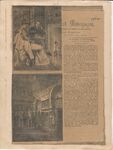
Legend
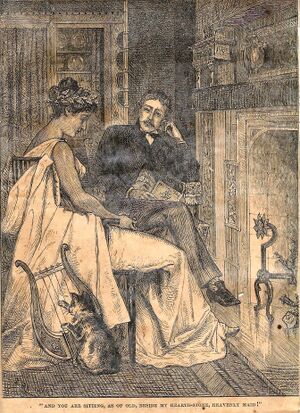
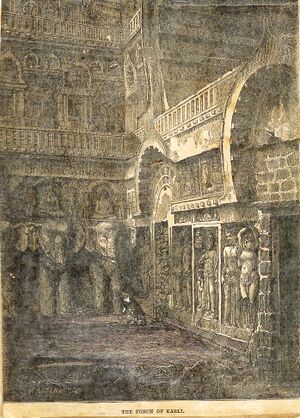
The Religion of Spiritualism
When we look philosophically and historically upon all the gods who have had their time upon this grain of sand which we call the world—-when We see glimpses of other divine ideas in the millions of worlds round the suns of the universe, we arrive at the idea that the supreme God sends to all points in infinity Ambassadors to symbolize His sovereignty. In one place the Ambassador is called Vishnu, to speak to the Indians; Zeus, with all his splendid court, to speak to the Greeks; Mahomet, to speak to the Turks; Jesus, Son of G, the gentlest, the wisest, the greatest of all God’s Ambassadors, to reveal God in man.
“Thanks to Jesus, man has refound his greatness through his humility.” This is according to Arsene Houssaye, in his book Des Destinies de l’Ame; and I do not think it will be difficult to find minds who fully endorse his sentiments. This book is one of the features of the present times—it is a protest for the existence of the soul against materialism.
I think it is now the time, before I end this paper, for me to explain what I mean by my expressions “Christianity” and “orthodoxy,” and, lastly, what I mean by a “Spiritualist.”
By my term Christianity it is needless to say that I am referring to the ordinary Christianity as taught by the churches—Roman, Greek, or Protestant—since the death of Christ. It is extraordinarily different from that taught by “the Ambassador from God,” to use Houssaye’s expression. The literal following of Christ’s words would have, however, brought about quite an altered state of things to those which now exist. An absolutely literal imitation of Christ’s life is an impossibility. What we are concerned in chiefly are the teachings and actions of Christ. Now, it is perfectly clear that we have almost lost the esoteric side of this teaching, and it is equally clear that we do not follow the exoteric side. The Christianity which has been spread through Christendom is not purely Christ-taught; I it is chiefly men-taught, and has descended into theological systems, which, if anything, drag us down from Christ, rather than help us to rise to Him. Were it not that multitudes of persons have risen beyond and above the religion of the day, and that the progress of mankind has always steadily gone on in a certain sense, the records of Christianity would present some very black pages in the world’s history; and I conceive it is the work of Spiritualism to bring back the wandering soul of Christianity. So anxious have Christians been to glorify the character of their master, Christ—an unnecessary work for man to do—that they have - done what Christ never did; that is, they have limited the power of One whom Christ called His Master and Father, and they would put all soul out of the universe now that Christ is not bodily in it. This has been the “materializing theology” that Christianity has induced, and it does not come from Christ, but comes from men.
<... continues on page 8-306.1 >
Editor's notes
Sources
-
London Spiritualist, No. 362, August 1, 1879, pp. 49-51
Inlay
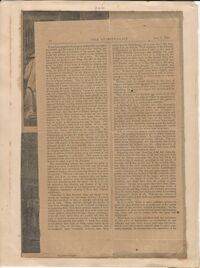
< The Religion of Spiritualism (continued from page 8-306) >
It has been taught by theological writers that revelation has ceased, and the logical following of this teaching has been naturally the materialism of the present day. No doubt this process has been required in the wisdom of Infinity for some perfecting of our powers. We cannot say—but we do know one thing, and that is that this materialised Christianity is not enough for us; and as a proof we point to the want of vitality in religion, and the dissatisfied, and unsatisfactory state of humanity when, in spite of the teaching of Christ to “love our neighbours as ourselves,” we are almost as far as ever from it practically. It is true that over a great portion of the face of the globe there is a wider spirit of toleration in religious matters. This is a phase in the world’s history, and does not belong to Christianity alone. By Christianity I mean, therefore, the religion practised by all who use the name of Christ as their head, and naturally in using the word “orthodox” I mean the party dominant by a majority of numbers or power in any church in Christendom. The unorthodox must always be the minority, and the term does not necessarily decide that one or other is right or wrong, and may apply to all forms of Christian worship, whether Roman or Protestant. The people who dissent from generally-received views are naturally those people who take the things of religion so much to heart that they have a distinct courage of their own to declare their persuasions, if they are not those entertained by their leaders. The mass follow their leaders; the few think for themselves. The orthodox may be right, or the unorthodox may be right. Who can really know? Only God can decide. So we must rest in charity with each other on that account, but we must have terms, nevertheless, of some kind. The unorthodox, i.e., those who are not content with the Christianity of the day, are those who will welcome the revival of spirit, and who will see through the vista of Spiritualism the light they are seeking for shedding its rays on the cold religion of the day—the religion which, unless reformed by an influx of a spiritual nature, must surely die, killed by our own hands. It will not, however, die—no religion perishes; it only becomes superseded by a fresh revelation of God’s power, when the power of the previous emanation is exhausted. This power is now exhausted—not, however, because the source is dry; but because we cease to go to the Fountain.
The materialising process has reached the point at which it is not at all good for us to halt, and yet we are idly waiting and speculating this way and that way, instead of working for, and with, and through the powers of our souls. The time will come, if we leave our souls alone, and if we let them vapourise into our bodies, that even the spiritless form of Christianity which we have now amongst us will fall away. As it is, we are all undecided and divided, and because of our very indecision and division we let things alone, and call it “religious toleration,” whereas it is, in fact, religious indifference.
From time to time, however, there are always to be traced the footsteps on “the sands of time” of people who have not lived in vain, or who are still living and not in vain. These, whether through the beauty of their lives, through their love of God, and of humanity as proceeding from God, leave precious records of their saintly lives; or whether through their noble deeds and works, whether exemplified through science, philosophy, or art, all those whose lives are marked out from the mass of mankind I place on one side. Under whatever religious dispensation they might be born, these minds would always have been as white stones raised up to build the altar to Divinity. Their characters and circumstances must necessarily, however, have been acted upon by Christianity, cela va sans dire; but these people I do not include. When speaking of the influence of Christianity in Christendom, I refer to the mass of so-called Christian humanity; and certainly this mass is still at so low a spiritual level as to fully justify the feeling which so many have at the present time, that unless we have some vivifying element introduced into the Christian religions of to-day, theology is becoming powerless to stem the progress of materialism and scepticism, or to affect the actions of man as it professes to do. If that day should come when religion sinks under the government of materialism, it will be accompanied by the utter decline of Christendom as a power in the history of the world.
Without spirit we should descend to the level of matter; and matter without spirit, if there could be such a thing, would be a mass of inert atoms. Of course, this is pursuing the image to a logical but ultimate goal far away in the distance.
This, of course, is not the wish nor desire of all who love this world, as the place in which we are placed by God’s will; and as active husbandmen of His garden it is our duty to work to avert such a calamity.
A Spiritualist is, I conceive, one who thoroughly believes in the spirit world being in constant relation with this; who does not believe that revelation is ended; one who is cordially opposed to materialism and to many theological doctrines, both of to-day and of the last few centuries; one who sees in the studies of theosophy and kindred sciences avenues heavenward. But I shrink from describing what all spiritually inclined people know full well; in any case, a Spiritualist should be a term used only in the widest sense at present.
It is, of course, one thing to profess and another thing to be. To profess Christianity and to follow Christ are two mightily different things. To profess Spiritualism and to be a Spiritualist are equally different. They are broad terms, Spiritualism and Spiritualist, but useful, nevertheless, for in both can we include members of any religion. The future will bring a little more order and arrangement in the present chaos.
Supposing that some observing Jews had taken the trouble to save the wine that we are told was made from water by Christ—supposing that they had taken the trouble to have it analysed, according to the science of the time, and it was proved that it was veritably wine, and that, on the other hand, responsible persons could swear that it was previous to the miracle unadulterated water; supposing all this was put upon record. Supposing, also, that the doctors of the day positively swore to the previous blindness of the beggar and his subsequent cure. Ho doubt it would have caused great sensation, and would have been the subject of great discussion; but can we suppose that these facts alone, unaccompanied by the loving, enlightening words of Jesus, and His touching words to His disciples, promising them His Spirit, would have had much effect in spreading Christianity! Hone at all. Without the contact of spirit with spirit no new birth and spiritual illumination can come forth.
So it is now. There is quite sufficient evidence to prove the fact of supernatural power and of the reality of most of the so-called spiritual phenomena; but the cognisance of these truths will not spread Spiritualism, and, alone, will not in reality make one pure, true Spiritualist.
What must be is that coincident with our acceptance of the a b c of Spiritualism, as exemplified in our ordinary and most crude seances, shall come the conviction in men’s and women’s souls of what is called, commonly speaking, the supernatural—the conviction of the <... continues on page 8-307.1 >
Editor's notes

